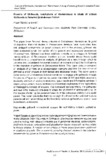Please use this identifier to cite or link to this item:
https://cris.library.msu.ac.zw//handle/11408/1181| Title: | Erasure of girlhoods, inscriptions of womanhood: a study of erased girlhoods in selected Zimbabwean fiction | Authors: | Ngoshi, Hazel T. | Keywords: | Girlhood, womanhood, erasure, feminist literary criticism, patriarchal power | Issue Date: | 2011 | Publisher: | Polytechnic of Namibia: Department of Communication | Series/Report no.: | NAWA: Journal of Language and Communication;Vol. 5, No. 1; p. 241-249 | Abstract: | This paper takes feminist literary criticism of Zimbabwean literature as its point of departure. Feminist studies in Zimbabwean literature have more often than not, critiqued womanhood as broad category and in the process, girlhood has been subsumed under the ambits of the general and aggregated experiences of womanhood. Girlhood has been relatively invisible as a category in feminist literary criticism of Zimbabwean literature and yet feminist literary theory could benefit from a comprehensive analysis of girlhood as a lens through which to perceive and understand the overall condition of womanhood and the implications of the depiction of girlhood in Zimbabwean fiction. This paper aims to construct an analysis of girlhood as a disaggregated category and how the very notion of girlhood is under erasure at both textual and discoursal levels. The paper uses a cross-section of Zimbabwean fictional narratives to engage with girl hoods through the prisms of legacies of patriarchal power, the wake of HIV and AIDS, economic insecurity and lack of access to education, basic health and information services. I argue, using Laclau's discourse theory and Derridian exploration of the implications of Heidegger's concept of erasure, that increased responsibilities, the patriarchy and economic insecurity coalesce to erase the childhood of adolescent girls in the process shattering the perceived stability of the categories child/girl and adult/ parent. The paper concludes that the concept of girlhood in the selected texts is paradoxical and undermining as the boundary between girlhood and womanhood is rendered undecidable. | URI: | http://hdl.handle.net/11408/1181 | ISSN: | 1993-3835 |
| Appears in Collections: | Research Papers |
Files in This Item:
| File | Description | Size | Format | |
|---|---|---|---|---|
| ngoshi abstract.PDF | 13.17 kB | Adobe PDF |  View/Open |
Page view(s)
34
checked on Jul 24, 2024
Download(s)
2
checked on Jul 24, 2024
Google ScholarTM
Check
Items in MSUIR are protected by copyright, with all rights reserved, unless otherwise indicated.



